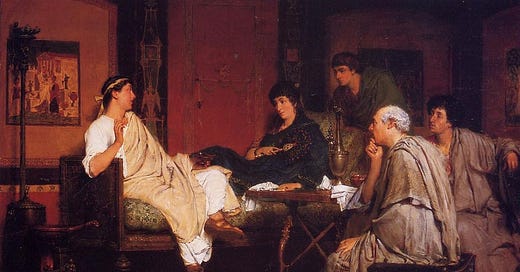Journal Note on Carl Schmitt's Last Years, Their Friendship, and Léon Bloy - Ernst Jünger
Two reminders of Carl Schmitt in the post. Peter Tommissen sent a lecture from Belgium that I had not heard of until now: “The Historical Structure of the Contemporary World-Opposition Between East and West. Comments on Ernst Jünger's Book ‘The Gordian Knot’”.
I could only take random samples; and here too I sensed a difference in our viewpoints. Carl Schmitt is primarily interested in the political-legal background of events and persons – he traces this to poetry, to characters in the dramas of Schiller and Shakespeare. I, on the other hand, am concerned, however successfully, with the mythical core of history, which continues to have effects in the present – for example, with regard to technology and the modern titans, as well as the relationship between East and West.
This distinction did not affect our discussions; on the contrary, it often seemed to me as though Carl Schmitt brought the chessboard for our pieces. Sometimes he would set one aside – it was not easy for him to admit an error, but he paid its due tribute in logic.
*
Next, the report on “The Last Years of Carl Schmitt”. It came from Plettenberg, with no indication of authorship. The content leads me to believe that I once met the author. It should be noted that I came into conflict with Carl Schmitt's friends more often than with him. This is also confirmed by the conclusion of the report: the author describes a final visit, during which Carl Schmitt no longer recognised him, but asked if he had met me. C. S. replied: “He is not easy to get close to. He has an aura all his own. But he is a true friend.”
*
I saw Carl Schmitt for the last time on his ninetieth birthday, and found him still fresh. His letters were also substantial. He wrote about “the unknown Schiller,” about “machines driven by fire,” and other things. From Stierlein he asked for the exact wording of a quotation from Goethe. After the ninety-fifth, Alexander received another greeting from him.
It seems that his superior irony was more of a protective cloak. “These are now our victors,” he once told me, pointing to a pamphlet. His response to the accusation that he was the gravedigger of the Weimar Republic is well known: “Where there is a gravedigger, there must have already been a corpse.”
I strongly disagreed with him when Hitler called for a state of emergency after the so-called Röhm purge, and Carl Schmitt not only said, but even wrote, that “the Führer establishes the law.” I no longer remember the exact wording. What he meant was that Hitler's legality, after the Enabling Act, was no longer in doubt. This was debatable – I was only surprised that such a sharp mind could not see that his formulation, however logical, represented political harakiri in time and place. I was coming from Helgoland at the time; when we passed by his house on Fichteberg I asked him if he had installed a machine gun in the cellar – he acknowledged the joke with a puzzled look.
In him there was Westphalian stubbornness paired with Roman concision. He would not have needed another head, only another state. It seems that, in the end, he began to suffer from delusions, as many severely persecuted people do. Here is how his friend describes them:
“Sound waves pervaded the house from every direction. Electronic bugs were hidden everywhere. His enemies had dealt him a final blow. They sentenced him to death, but the fusiliers never showed up. He had been both convicted and pardoned; this went on for several months. It was on this day that Schmitt experienced his ‘1984’, as Orwell described it. A mob formed in the street in front of the house, making an infernal racket and handing out leaflets filled with wild accusations. Unidentifiable enemies broke into his house at night, drank his wine, amused themselves in his library, took what they thought was valuable, stole his writings and manuscripts.”
The madness finally embodied itself in a disturbing figure who rustled about the house, but only at the behest of an anonymous force, and whom Carl Schmitt called the “Kra”.
*
If the author believes that his relationship with Carl Schmitt in the last years of his life is reminiscent of Wilhelm Waiblinger's relationship with Hölderlin, then, after reading this passage, I can agree with him. The comparison can be made on many fronts. The figure of Carl Schmitt is certainly a solitary one, but at the same time typical of fate and the individual in the world civil war.
While reading, I came across a misinterpretation of a passage from my journals, which should be corrected before it goes to print – preferably by the “good domestic spirit” Anni Stand. From her I also learned the last “holy” words of the San Casciano hermit, a quote from Léon Bloy: “Whatever happens – it is worthy of adoration.”




